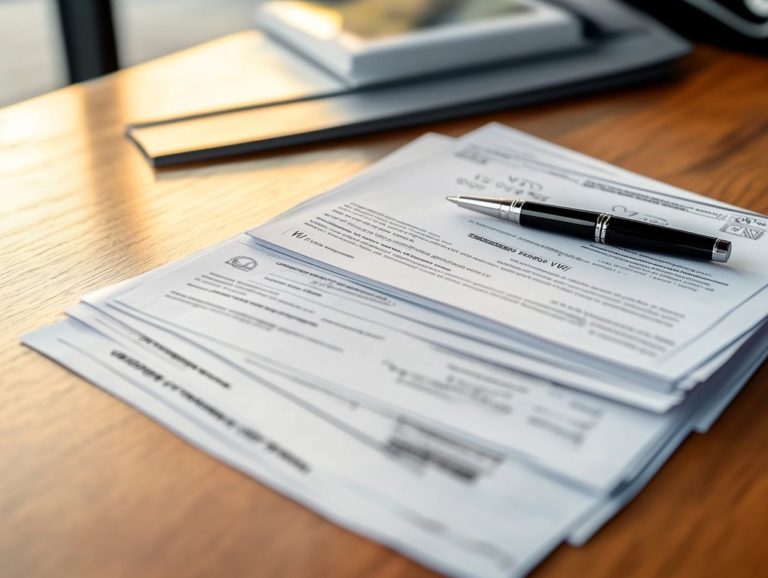How to Navigate Financing a Used Car Purchase
Purchasing a used car can be a savvy financial decision, offering remarkable cost savings and numerous advantages compared to new models. Yet, navigating the financing process may seem daunting without the right guidance.
This article delves into the benefits of selecting a pre-owned vehicle, highlights essential factors to consider before making your purchase, and outlines the financing options available to you. Discover tips to secure the best deal and ensure a seamless financing experience.
Get ready to hit the road with confidence and savings!
Contents
- Key Takeaways:
- Benefits of Buying a Used Car
- Factors to Consider Before Financing a Used Car
- Types of Financing Options for Used Cars
- How to Secure the Best Financing for Your Used Car
- Understanding the Financing Process
- Ensuring a Smooth Financing Experience
- Frequently Asked Questions
- What are the steps to financing a used car purchase?
- Can I get a used car loan if I have bad credit?
- What is the difference between buying a used car with cash and financing?
- Do I need to have a down payment for a used car loan?
- What documents do I need to finance a used car?
- Can You Negotiate a Used Car Loan?
Key Takeaways:

- Save money by buying a used car. Explore financing options like traditional loans, dealership financing, and online lenders.
- Prioritize your budget and needs. Negotiate and compare financing offers for the best deal.
- Understand the financing process and necessary documentation. Avoid common pitfalls for a smooth experience when purchasing a used car.
Benefits of Buying a Used Car
Purchasing a used car presents a wealth of advantages for those keen on saving money while securing a dependable vehicle. The financial perks are undeniable; you ll often encounter lower purchase prices compared to new ones.
This affordability can truly be a game-changer, especially regarding financing options. Lower overall costs often lead to better loan terms, resulting in reduced interest rates and more manageable monthly payments.
Used cars depreciate more slowly, ensuring you receive greater value for your investment. Opting for a certified pre-owned vehicle, which is a used car that has been inspected and certified by the manufacturer, enhances your confidence. It also provides a comprehensive vehicle history report, offering reassurance regarding reliability and maintenance.
Cost Savings and Other Advantages
Cost savings stand out as one of the most persuasive reasons to consider a used car. The average price of a used vehicle is considerably lower than that of a new one.
However, it’s crucial to keep in mind the associated expenses, such as insurance premiums, which can fluctuate depending on the car’s age and model. Conducting a thorough inspection before making a purchase will ensure that the vehicle is in good condition, helping you avoid unexpected repair costs and making your financial experience even more favorable.
Factors to Consider Before Financing a Used Car
Before exploring financing options for a used car, assess your budget and needs to make buying a car easier. Start by evaluating your financial situation and understanding how much you can comfortably spend. Additionally, be sure to learn about what to expect during the car financing process to determine the portion of your budget allocated for a loan payment.
Don’t overlook your credit score requirements. This will play a significant role in securing favorable loan terms during the approval process.
Assessing Your Budget and Needs
Assessing your budget and needs is crucial when considering financing a used car, as it lays the groundwork for a sound financial decision. By analyzing your financial situation, you can navigate the complexities of monthly car expenses with greater ease.
Utilizing an auto loan calculator helps you explore various financing options that fit your budget. This tool is invaluable in understanding how different interest rates and loan terms affect your overall costs.
It’s essential to account for long-term vehicle maintenance and insurance expenses. These factors significantly influence your financial well-being. By considering all these components together, you can ensure your car purchase is not just practical but also sustainable over time.
In summary, buying a used car offers financial benefits and a variety of financing options. Additionally, understanding new car financing options can further enhance your informed choices, leading to a successful purchase.
Types of Financing Options for Used Cars

When financing a used car, you’ll encounter a variety of options tailored to suit your unique needs and preferences. To navigate these choices effectively, it’s helpful to know how to understand car financing terms. From traditional loans and dealership financing to online lenders, each choice offers its own set of benefits.
It s vital to evaluate these alternatives carefully to uncover the best interest rates on car loans that align with your financial circumstances.
Traditional Loans
Traditional loans, often provided by banks and credit unions, present an appealing option for financing a used car, thanks to their structure and the potential for competitive loan terms.
These financial institutions typically offer various options tailored to different borrower profiles. This can lead to more favorable outcomes for you. By collaborating with reputable lenders, you can benefit from several advantages, such as transparency in loan conditions and the reassurance that comes from dealing with established entities.
It s crucial for you to compare various auto loan offers, keeping in mind key factors like loan terms and interest rates. This thoughtful comparison allows you to uncover the best deals available, enabling you to make smarter financial decisions that align with your personal budget and repayment capabilities.
Dealership Financing
Dealership financing can be quite appealing, offering you convenient access to a range of dealer financing offers, especially when you’re trading in a vehicle. This option simplifies the car-buying journey, allowing you to secure a loan directly at the dealership.
However, it s important to weigh the potential drawbacks. Many dealerships impose specific credit score requirements, which can limit your options if your score isn t up to par. While the temptation of easy financing is strong, it s essential for you to engage in thorough negotiations concerning the purchase price.
This ensures you don t miss out on savings that could balance out the often-higher interest rates tied to dealership loans. Don t miss out on great deals!
Online Lenders
Many people prefer online lenders because they offer great convenience for financing a used car, providing competitive auto loan rates and a streamlined approval process.
The efficiency of the loan application process means you can bypass the long waits often associated with traditional banks, making it faster to secure the funds you need.
Choosing the right lender is vital; you can enhance your decision-making by checking user reviews and asking detailed questions about terms and fees. This way, you ensure that your choice aligns perfectly with your financial goals and needs.
How to Secure the Best Financing for Your Used Car
To secure the most advantageous financing for your used car, it’s crucial to master the art of negotiation during the purchase and to grasp the many factors that can impact your car loan payment. For first-time buyers, checking out your guide to car financing can be particularly helpful.
Tips for Negotiating and Comparing Offers

Negotiating effectively and comparing offers is essential for securing favorable financing, particularly as you navigate the loan application process and evaluate dealer financing options.
By employing smart ways to negotiate, you can strengthen your position and potentially lower those interest rates. Understanding average car loan interest rates gives you the insight needed to identify what constitutes a competitive rate, putting you in the driver s seat.
Leveraging offers from various lenders not only enhances your bargaining power but also paves the way for better terms and conditions. When financial institutions realize that you re exploring multiple options, they may be more inclined to lower their rates to win your business. This can translate into significant savings over the life of your loan.
Start comparing offers today to find the best rate!
Understanding the Financing Process
Understanding the financing process is essential for anyone considering a used car. For a deeper insight, check out understanding used car financing options and follow key steps like completing paperwork, navigating contracts, and securing loan approval.
Grasping these elements will enable you to make informed decisions and streamline your experience.
Documentation and Contracts
Proper documents and contracts are crucial. They formalize your financing agreement and ensure a smooth loan application process.
The significance of having all necessary paperwork cannot be overstated. It protects both you and the lender throughout the transaction.
Key documents you ll typically need include:
- Proof of income
- Credit history
- Vehicle identification number (VIN), which uniquely identifies the car and confirms its legitimacy.
It s essential for you to understand the terms outlined in the financing contract, including interest rates, loan duration, and repayment schedules. By grasping these components, you enable yourself to make informed decisions, setting the stage for a rewarding ownership experience.
Ensuring a Smooth Financing Experience
To ensure a seamless financing experience when purchasing a used car, it’s crucial to be aware of common pitfalls that can complicate the process. Knowing how to prepare for buying a used car can help you avoid these obstacles and stay on track with your financial goals.
By navigating these challenges with insight, you can make informed decisions that align with your objectives.
Avoiding Common Pitfalls
Avoiding common pitfalls is key to your success in purchasing a used car. Pay attention to details like vehicle history reports, which reveal past accidents, ownership changes, and potential odometer discrepancies.
Many aspiring car owners might overlook vital vehicle inspections. Failing to do so can lead to unexpected financial strain due to hidden mechanical issues post-purchase.
By prioritizing thorough research and being diligent with these inspections, you can significantly boost your confidence in the transaction. This ensures you make a well-informed decision that aligns perfectly with your budget and safety needs.
Frequently Asked Questions

What are the steps to financing a used car purchase?
To finance a used car purchase, first, determine your budget and get pre-approved for a loan. Next, research different lenders and their interest rates, and compare them to find the best option. For detailed guidance, check out this resource on how to secure a used car loan. Then, find the car you want and negotiate the price. Finally, complete the loan application process and sign all necessary paperwork.
Can I get a used car loan if I have bad credit?
Yes, it’s possible to get a loan for a used car with bad credit. However, you may need to pay a higher interest rate and provide a larger down payment. It s important to shop around and compare offers from different lenders to find the most affordable option.
What is the difference between buying a used car with cash and financing?
Buying a used car with cash means paying the full purchase price upfront. Financing allows you to pay for the car over time with interest. With financing, you may be able to afford a more expensive car that you couldn’t pay for outright.
Do I need to have a down payment for a used car loan?
While a down payment isn t always required, it s highly recommended. A down payment can lower your monthly payments and reduce the total interest paid over the loan’s life. It also shows the lender that you are financially responsible.
What documents do I need to finance a used car?
To finance a used car, provide proof of income, such as recent pay stubs or tax returns, along with your driver’s license and proof of insurance. You may also need to show proof of residence and references. Your lender may have additional requirements, so it’s best to ask beforehand.
Start your used car financing journey today and drive away with peace of mind!
Can You Negotiate a Used Car Loan?
Yes, you can discuss the details of a used car loan. You have the power to secure a better deal!
Consider the interest rate, loan term, and monthly payments. Research and compare offers from different lenders to get the best terms possible.






